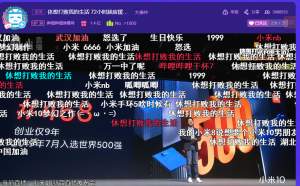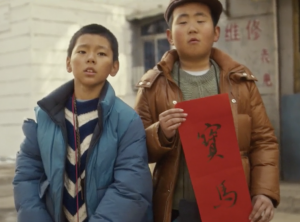
Tmall released a short film to promote its Christmas beauty boxes
News From China
Christmas is not an official holiday in China, although it has long been popular among urban youths who have adopted it as an occasion to celebrate by exchanging gifts and dining out. Brands have tapped into these consumption trends and the IP surrounding Christmas with a slew of secular marketing campaigns over the month or so. Here are a few of the highlights from this year:
- WeChat worked with a dozen brands — running the gamut from Pizza Hut to Fendi — to create “Wish List,” a mobile game that had users hunt for the brands in order to gain entry into drawings for more than 13,000 prizes.
- Tea and coffee brands were especially active in their Christmas-themed promotions, tying into the holiday’s associations with spending time catching up with friends over warm drinks. Nescafe’s retro campaign expanded the coffee brand’s product line into gift items such as handbags, notebooks, and coffee cups, and buyers were invited to attend a themed party in Beijing. Lipton developed a range of similar products through a collaboration with streetwear label Tyakasha, while Swiss Miss partnered with teahouse chain Happy Lemon on limited-time chocolate-based beverages.
- JD.com’s “Super Christmas Affairs Bureau” sent out Santas to make deliveries, which drew a lot of attention, and was supported by social media campaigns with influencers and content creators, giveaways via Weibo and a Shanghai pop-up store to connect consumers with the e-commerce company’s version of Christmas.
- Tmall’s holiday offerings centered around a beauty boxes with limited-edition and collaborative products from 14 international brands, including Fenty, Kanebo and Eucerin. The gift boxes were promoted through a short musical film that pays homage to Hollywood hits such as “La La Land” and “Frozen,” as well as through an interactive light show held in Shanghai.
The final installment of the “Star Wars” saga has fizzled in China, but brand collaborations with the franchise’s valuable IP may fare somewhat better.
- Pepsi released limited-edition “Star Wars” character cans for its diet soda with an augmented-reality feature that allowed consumers to turn the cans into light sabers on their mobile phones. Pepsi also worked with Tmall to launch levitating can gift box set, which sold out within 30 minutes. The brand also developed a social media campaign with influencers, celebrities and fans all creating content around the collaboration.
- Tmall launched an online “Star Wars” pop-up shop to sell other limited-edition products from brands such as Adidas, Bose and Le Creuset.
- Offline experiences in China included the appearance of the BB-8 droid at the League of Legends All-Star Weekend and a themed exhibition at Hangzhou’s Grand Canal Place shopping center featuring immersive experiences.
L’Oreal tapped actress and director Zhao Wei to direct her first brand film, “Age Perfect” (时光魔历), which introduces a new skin-care product from the French beauty giant. The story follows an eight-year-old girl who receives a magical calendar from her mother that allows her to travel into her future, ultimately strengthening the mother-daughter bond through the theme that “beauty is in every moment, and every age is just right.”
Didi Chuxing (aka the Uber of China) continues to step up its content game in an effort to burnish its image among disaffected consumers. Its latest project is “Let’s Go, Driver!” (出发吧, 师傅), a reality show on iQiyi that shows off the varied talents and skills of the service’s drivers, encouraging viewers to vote for their favorites. The series lists Lili Cheng, Didi’s recently established media company, among the producers.
Tencent Video recently released two reports on trends in video streaming, with the following key observations:
- Young audiences turn to reality shows in order to understand and participate in discussions around social issues, valuing diversity of viewpoints and the ability to express independent critical though. As a result, reality shows are expanding to cover a broad range of subjects that can reach different groups of niche viewers.
- Scripted programming is increasingly focused on quality over quantity as part of the effort to boost paid subscriptions for video-streaming services. Millennial and Gen Z audiences firmly in the mainstream, accounting for more than 70 percent of viewers, and the proportion of male viewers has increased sharply over the past year to more than 54 percent.
News in English
- Bytedance has denied reports that it could potentially sell TikTok, though it may be considering setting up a global headquarters for the subsidiary outside of China. WSJ
- Xiaohongshu (aka Little Red Book) and other content-driven apps such as Zhihu and Mafengwo lack effective routes to profitability despite their rising user numbers, and may ultimately be targets for acquisition by domestic tech giants. Technode
- IQiyi’s newly launched Knowledge App aims to combine education, entertainment and short video, with an emphasis on educational videos and content based on the video-streaming platform’s most popular IP, such as “Rap of China” (中国新说唱), “Fourtry” (潮流合伙人) and “The Big Band” (乐队的夏天). PR Newswire
- A joint report from Tencent and Maoyan highlights the enormous impact of online video on the entertainment industry. For example, while China ten highest grossing films sold 66 million tickets last year, the same films were viewed 503 million times online. Variety
- Nearly half of China’s 640 million video game players are female, a statistic that should not be overlooked by brands seeking to connect with the nation’s influential young consumer demographics. Radii
- Food-related content is trending on Douyin, and the top top influencers in the space can provide innovative opportunities for brands to place their products with direct links to e-commerce. China.org.cn
- Bruce Lee’s family is finally taking the Shanghai-based Kungfu fast-food chain to court over its longtime use of a likeness that bears a strong resemblance to the late actor and martial arts star. National Law Review
We’ve Got China Covered





